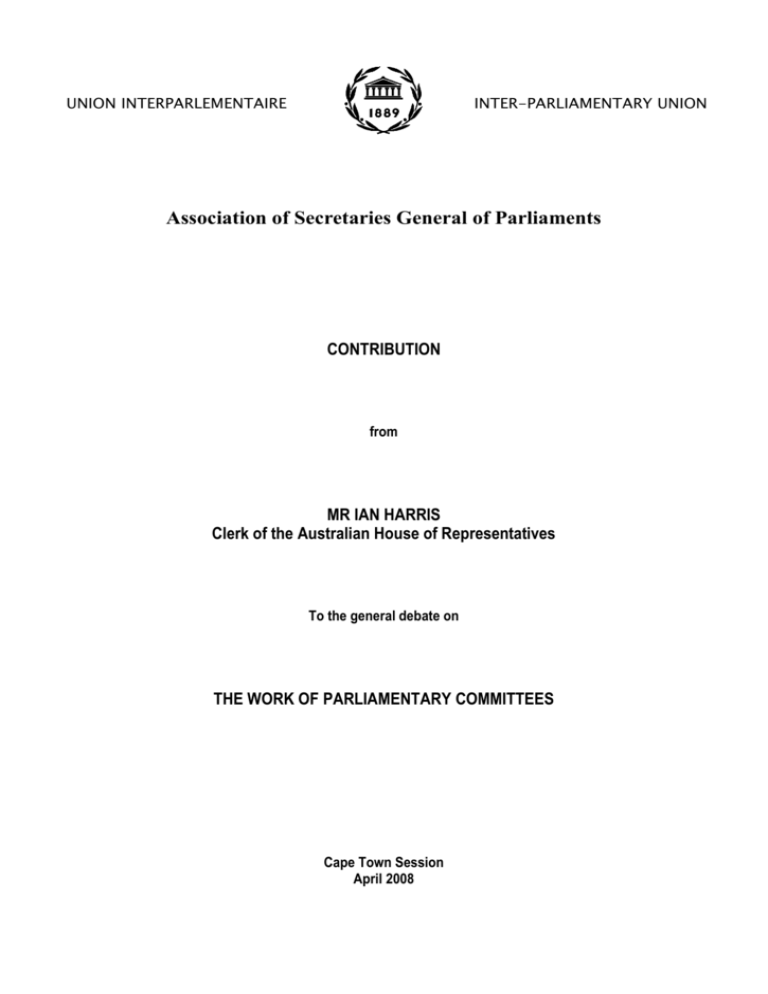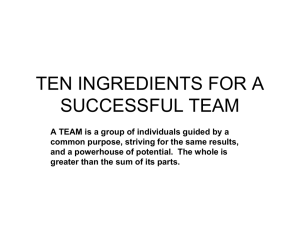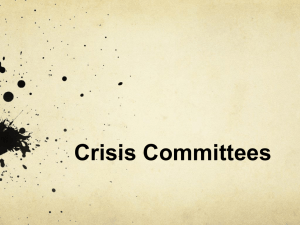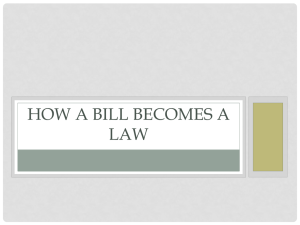What are the Functions and Needs of Parliamentary Committees
advertisement

UNION INTERPARLEMENTAIRE INTER-PARLIAMENTARY UNION Association of Secretaries General of Parliaments CONTRIBUTION from MR IAN HARRIS Clerk of the Australian House of Representatives To the general debate on THE WORK OF PARLIAMENTARY COMMITTEES Cape Town Session April 2008 The role of parliamentary committees in the light of the twentieth anniversary of the Australian House of Representatives modern committee system Introduction In 1987, the Australian House of Representatives established a comprehensive committee system by setting up eight general purpose standing committees. At the same time, the functions of the Joint Committee on Foreign Affairs and Defence were extended. The total result was that the House had the capacity to monitor the work and operations of all federal government departments and agencies1. With occasional variations in total number(increased to nine in 1992, thirteen in 2002 and twelve in 2008), these committees have remained operational throughout that time. The twentieth anniversary of the establishment of the House’s modern committee system thus occurred in 2007. However, because the high possibility of a general election at about the time of the actual anniversary, the Department of the House of Representatives decided to postpone commemorative parliamentary action. The major event was a seminar held in conjunction with the Parliamentary Studies Centre based at the Australian National University. The Parliamentary Studies Centre was the subject of a communication in Nusa Dua, Indonesia, in May 20072 . The seminar was conducted in Parliament House Canberra on 15 and 16 February 2008, and provided valuable insights into the formation, functions and operations, and deficiencies of the House’s committee system. The papers presented and the transcript of proceedings is available on the Australian Parliament’s website3. The seminar was attended by current and Members of the House, current and past members of staff, and leading academics and thinkers from Australia and overseas. Presentations and subsequent discussions focussed on the practical side of parliamentary committees and the experiences of those who participated in and chaired parliamentary committees over the preceding twenty years. Academic presentations gave an institutional and participative perspective. A staff person raised considerations in assisting committees and posed challenging questions about wider participation, particularly Australia’s indigenous people. The seminar concluded with the contemplation of the current situation, the challenges facing parliamentary committees and the role of committees in determining the nation’s future. It is not the intention to examine each presentation and ensuing discussion in detail. The occasion presented an opportunity to reflect on certain aspects of parliamentary committees, and to compare experiences across a number of jurisdictions. Specific reference will be made to certain aspects subsequently, particularly when the conventional categorisation was challenged or questioned. Functions of Parliament The traditional view of the functions and needs of parliamentary committees are appropriately viewed within the functions of the legislature itself. Parliament discharges the following major functions: 1 House of Representatives Practice, 5th edition (2005) page 623. http://www.asgp.info/Resources/Data/Documents/SETLTFCXMBSXLFACCVKJEVTDWFQKDI.do c; http://www.asgp.info/fr/pastmeetings/ 3 http://www.aph.gov.au/house/committee/20_anniversary/index.htm 2 2 Forming the basis of government, under the system of responsible government. Legislating (including the sub function of providing finances, by means of legislation). Facilitating Members to perform their representation function: providing a forum for the discussion of issues of national concern; being a sounding board for the people. Accountability, keeping the Executive accountable to the people through the legislature. Sometimes these functions overlap, and it is important not to see them as isolated or mutually exclusive. Usually a legislature does not legislate on Monday, provide a national forum on Tuesday, and make Wednesday the day on which is performs its function of accountability. The functions frequently cross categories; when Members are debating legislation, they are obviously involved in the legislative function, but as most Bills are initiated by the Government, the Parliament is also exercising its accountability function. This is reflected in the functions that parliamentary committees perform. Functions of parliamentary committees General functions: Parliamentary committees can range over all the functions that the legislature itself performs, with the exception of determining the formation of the Government. They perform functions which Houses of Parliament are not as well-fitted to perform, such as finding out facts of a case or issue, examining witnesses, sifting evidence and drawing up reasoned conclusions. Accountability: Committees provide an increased ability for the Parliament to scrutinise government policy and expenditure. Committees are frequently appointed to parallel the ministerial or departmental structure adopted by the Executive. Each committee has a responsibility to provide oversight of government agencies within specific portfolios. It is not unusual for the scope of each committee’s scrutiny power to be provided in a list from the Speaker at the beginning of each Parliament. The accountability functions of parliamentary committees include their ability: to conduct inquiries; to compel the attendance of persons and presentation of documents; and to make reports and recommendations to Parliament. In another presentation, I have identified the important role of parliamentary committees in assisting Parliament to perform a role in the peace building process. Parliamentary oversight of the security sector (military, police & intelligence services) is desirable as part of the legislature fulfilling a peace-keeping role. Frequently this oversight occurs under a legislative framework, and is often conducted by parliamentary committees Legislation: Committees can be an important part of the legislative process. Examination by a committee can allow public input into the legislative process. Representation/ Education of Members: Committees enable the Parliament to be taken to the people, and enable evidence to be gathered from expert groups or individuals. They enable direct contact between the public and representative groups of Members of Parliament and a flow of information to Members. They facilitate an 3 increased level of collegiality between members from different political parties who may not otherwise have the opportunity to work with one another. One interesting concept that emerged from the twentieth anniversary seminar related to the quotation from [Australian] House of Representatives Practice cited in footnote 1 in this paper. Professor John Halligan, from the University of Canberra, discussed the committee role of monitoring or shadowing government departments and instrumentalities, raising the question of where a committee system begins and ends and posing the consideration that a fuller appreciation of committee contributions needed to take into account complementary functions performed by parliamentary committees. Professor Halligan identified three basic types of committee policy role: o Scrutiny o Investigation (divided into review and strategy) o Legislation. Two broader responsibilities were central to the performance of these roles: o Parliamentarians’ recruitment. And o Public interaction and communication. The Speaker of the House opened the seminar. He saw accountability, participation and collegiality as three features that a functional system of standing committees could hope to achieve. There was some examination at the seminar of the concept of one function of a parliamentary committee as tapping into the wisdom of the Australian people. One presenter, who had been a committee member, the Chair of a committee, and subsequently a senior Minister, drew on his ministerial experience to indicate that the civil service was overwhelmingly comprised of hardworking, thoughtful and dedicated people who wanted the best for Australia. However, there were orthodoxies in all departments and agencies, and vested interests. It was the role of committees to expose, to test and to challenge these approaches. One presenter described the success of the committee system as a coming together of something like a trinity, comprised of politicians, public servants and the people. I believe that there is a temptation to believe that all wisdom resides in Canberra, the national capital of Australia. Committee members, representing a cross section of Australian society, bring a practical perspective to the examination of public issues, and they provide a means to tap into the wisdom of the people. However, there was also a serious questioning at the seminar about the way in which committees operate. One presenter pointed to a lack of understanding of the work that committees perform as being a barrier to participation. Committees had widened their method of gathering evidence to encompass seminars, roundtable discussions and community statement sessions. However, the replication of a parliamentary environment outside of Canberra was replicating its culture of antagonism and debate and discouraged ordinary people from anticipating in the process. There was a need for Parliament to become more innovative in communicating with the general population, and in opening committees for external communication. One paper focussed on the impact of technology on committee consultation, and whether increased usage of deliberative information communications technologies would aid or hinder the work of House committees. The concept of e-communication was explored. A need was identified to get out of central 4 business districts, hotel conference rooms, parliamentary buildings, and to enter schools, community halls and similar locations. In taking Parliament to the people, a note of caution was sounded that members not be seen as people who fly into remote locations, take information as they need and then fly out again. Witnesses at the grass roots level expressed feelings of frustration at explaining the same things to different people who then flew out again. There was a need to establish long-term working relationships within communities. This could be undertaken by secretariat staff. The need for relationship-building was of particular concern in relation to Australia’s indigenous population. There were significant barriers to indigenous participation in committee inquiries. The Administrative Review Committee of the Parliament of the State of Queensland identified the following as barriers to participation: o Lack of civics education (including how to vote and becoming more involved in the political process); o Racism; o Lack of self-confidence; o Higher priority issues, more close to existence such as health and housing); o Mistrust of government; o Westminster systems being inappropriate for indigenous people; o Participation being seen as a concession of sovereignty4. A matter of personal concern to me has been the way in which the system appears to be geared to a literate, Anglo-Saxon audience, both in relation to inputs and outputs. It was gratifying to observe, some time ago, a parliamentary committee report relating to an indigenous matter to be presented in audio-visual as well as written form. Methods of appointment of parliamentary committees & their inquiries Investigatory committees are usually appointed: o by Act of Parliament o under standing orders o by resolution of the House o In bicameral parliaments, by the adoption of identical resolutions of appointment by both Houses. Committee inquiries are established by terms of reference that are referred either by: o a Minister (the usual way of gaining an inquiry); o a House (or both Houses in the case of joint committees in a bicameral system); or o self-referred (Under standing orders, an item of an annual report or a report of the Auditor-General into an agency that lies within the scope of the committee’s scrutiny powers under the Speaker’s list. In Australia, this is an increasingly popular method of instituting an inquiry.) 4 S. Lim Hands on Parliament, Paper to Australasian Study of Parliament Group July 2003 p2 5 Committees are usually empowered to compel the attendance of individuals and the presentation of documents. The defiance of an order of a parliamentary committee or the provision of misleading evidence may result in charges of contempt of the House. Stages of committee inquiry The common stages of committee inquiry are: Receipt of terms of reference. Collecting evidence: o Advertising; o Letters inviting submissions; o Internet. Processing of submissions: o Briefing papers; o Possible questions. Hearings; o booking venues; and o making some travel arrangements when meetings are held outside of capital city. Preparation of a draft report: o Reflecting the evidence and the trends indicated by committee; members in private and public meetings – Tensions in the process - A Chairman’s draft and the thoughts of other members; o Recommendations: How many and how specific? o Clarity of writing – Keeping the target audience in mind; o Printing arrangements. Presentation to Parliament: o “Leaks”. o Assisting in speaking arrangements. o Media conferences. o Post-tabling action. Possible limitations on powers of parliamentary committees The following considerations may impose limitations on the powers of parliamentary committees: Budget: It is important for the committee to have an agreed budget and to operate within that budget. A Minister may claim certain information to have public interest immunity on the grounds that disclosure would be prejudicial to the public interest (sometimes referred to as “Executive Privilege”). A committee may negotiate to receive the information in private or it is open in principle for the committee to challenge the Minister’s claim in the House by raising the matter as a possible contempt of the House; A Minster or a witness may declare information sought to be commercial-in-confidence, where similar considerations to those immediately above may apply; Matters that have never been tested are: o In a federal system, the ability to compel a public employee of a state or territory government, and 6 o In a bicameral legislatures the power to compel the attendance of a Member or staff person of the other House against the wishes of the individual or the House in question. A committee’s powers to gather evidence is balanced by the protection of parliamentary privilege extended to all authorised information provided to an inquiry. Government response to committee reports Once a committee has gathered adequate evidence it deliberates and reports its findings together with any formal recommendations to Parliament. In some jurisdictions, governments have undertaken to provide responses to committee recommendations within three months although it is not rare for a government to fail to meet this self-imposed time frame. Where the government response system is employed, it is not unusual for the Speaker to present a schedule to the House listing government responses to House and joint committees and as well as responses that remain outstanding. The Leader of the House also presents a list of committee reports showing the stage reached with government responses in each case. During the twentieth anniversary seminar, one paper was devoted solely to this topic. The suggestion was made that one of the most effective ways to increase government responses to committee reports and thereby increasing the effectiveness of parliamentary inquiries was for committees to follow up their own reports by measures which included: o Dedicated researchers attached to the committee secretariat (including the investigation of policy developments in departments), and o Inviting the relevant Minister to meet with the committee to update it on implementation of recommendations and explain any inaction. The author of the paper conceded that formal responses were not the only key to implementation of a committee’s work. Another presenter, who had been a committee Chair and a senior Minister, told the seminar that if a committee has identified a logical and achievable case for change, a responsive minister or government is able to adopt the likely recommendations before they are made. The presenter indicated: 7 Committee support In Australia, in 2006-07 the expenditure for the provision of services by the Committee Office was $A10.72 million. Staff numbered 65 out of a total departmental staff numbering 157. The Committee Office in the department has nine secretariats. Typically, secretariats support two or three committees. The 32 member Foreign Affairs, Defence and Trade Committee and its four sub-committees is supported by a single secretariat. Secretariats consist of a secretary, two to three inquiry secretaries, some additional research staff and two administrative officers – although staffing levels change between secretariats in response to changing workloads. Secretariats provide support through: provision of research support o drafting proposed terms of reference, briefing papers and committee reports provision of procedural advice on the operation and powers of a committee In Australia, staff of secretariats are employees of the department and are responsible to and under the direction of the Clerk of the House rather than individual committees or chairs. Staff are employed under the Parliamentary Service Act 1999 and subject to a parliamentary Service Values and Code of Conduct which includes the requirement to provide: non-partisan and impartial advice … to committees of each house, to joint committees of both Houses and to senators and members of the House of Representatives. It is imperative that members and senators trust departmental staff to provide impartial advice and maintain the confidentiality of private discussions. During the twentieth anniversary seminar, most oral presenters touched on the role of committee staff. One senior presenter said: Another former Chair said: 8 Secretariat staff in another inquiry were described as being absolutely sensational. Of course, it was satisfying to hear secretariat staff described in this way. However, a member from a committee secretariat pointed to the need for staff to be creative and innovative: This presenter also indicated: This contribution reflected a concept that has been for me a continuing consideration in the selection of committee secretariat staff: Whether generalists or specialists represent better value. Staff are sometimes retained because of specialist knowledge in a field, but it is more common for generalists to be employed. Specialist advisers can be contracted for short periods, but care needs to be taken that their personal convictions are not foisted on the committee. Conclusion The twentieth anniversary of the Australian House of Representatives Committee system provided a valuable opportunity to examine some of the traditional concepts underlying the operation of parliamentary committees. The contributions of members of the Association of Secretaries-General of Parliaments on the committee experiences of their jurisdictions will broaden this examination to an international scale, and thereby further enrich the study. 9






